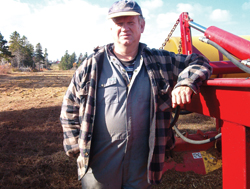
Features
Production
Research
Prince Edward Island blueberry industry experiences record season in 2004
blueberry industry experiences record season in 2004
April 23, 2008 By Stella Shepard
John Macdonald of Souris Line Road, prepares his land for next year’s crop of lowbush blueberries. Macdonald, a full-time producer, describes his farming methods “progressive.” He continually researches technology and adapts it to the industry and he has developed his own nutrient program to enhance his fruit production. Photo by Stella Shepard
 |
| John Macdonald of Souris Line Road, prepares his land for next year’s crop of lowbush blueberries. Macdonald, a full-time producer, describes his farming methods “progressive.” He continually researches technology and adapts it to the industry and he has developed his own nutrient program to enhance his fruit production. Photo by Stella Shepard |
Compared to the previous years, the blueberry season was considerably late this year on Prince Edward Island. In spite of the late harvesting, it was a record year for blueberry production on the island; blueberry fields were rich with good quality fruit and higher pounds than previous years.
The growing conditions were perfect this year for the P.E.I. blueberry industry, John Macdonald, president of the P.E.I. Wild Blueberry Growers’ Association, noted. He explained ideal blueberry growing conditions include a warm spring that starts off cool and wet, later warms quickly to set the blossoms on the plant. The growing conditions were not ideal for Maine, Nova Scotia and New Brunswick, which are considered the leading players in the wild blueberry industry. With climate conditions very poor in Maine, Nova Scotia, and New Brunswick it means there is a shortage of blueberry supply from these areas.
“Maine, alone, produces 80 million pounds of berries and the short supply from the leading players could mean better prices for Prince Edward Island blueberry producers,” Macdonald said. Macdonald, of Souris Line Road, has been growing blueberries since 1974. Over the years, he has seen the prices fluctuate. The last few years, he said, the market price for blueberries has been low. Two years ago, Prince Edward Island growers received only 35 cents per pound. Last year, the price was 40 cents. Processors were selling frozen berries $1.37 Canadian.
“The processors are reluctant to give a price for this year’s crop. However, island blueberry growers should expect a good market price this year,” Macdonald said.
Ron Weatherhead of Rainbow Farms, located in Upper Rawdon, Nova Scotia, is a blueberry grower and a processor. In 1993, he started with one processing plant and has since expanded his blueberry operation to three processing plants. Rainbow Farms harvests 350 acres annually. This year production was down to one-third.
“We should have harvested over a million pounds this year. Instead, we only harvested 300,000 acres. That is down drastically. When volume is down, it drives the price up, which has an impact on the blueberry industry. If the price is high on the store shelves, consumers will buy other products,” Weatherhead said. “Prince Edward Island growers will benefit with poor crops in other parts of the region and the U.S. all down at the same time. I am expecting the island price for blueberries to be as high as 55 cents to 60 cents per pound. And we hope to purchase blueberries from Prince Edward Island growers. But we can’t assume anything; someone else could buy all the island berries.”
Presently, the P.E.I. blueberry industry – worth about $25 million – is the third largest industry cash crop on the island. Macdonald said blueberry production will increase as the farmer increases his knowledge of clearing the land, producing a crop and learning better harvesting techniques. Macdonald, who considers himself a progressive farmer, developed a nutritional program for his crops, and continually experiments to develop new technology that will benefit the land.
“It is important that today’s growers seek out technology that is available worldwide and learn how to apply it to the blueberry industry in an effort to be competitive in the marketplace. The blueberry industry, supported by the many health benefits associated with the blueberry, has the potential to be a strong economic source for producers,” Macdonald said. “It takes approximately 10 to 15 years for a field to reach good producing yields and after that, with proper care, the land becomes more valuable. At the present time, there are a number of individuals entering the blueberry industry and the producing acres on the island has increased. This is supported by the increase in blueberry yields over the last couple of years. In 2002, the island produced 4,382,642 pounds and in 2003, the island produced 7,358,116 pounds of blueberries.”
Print this page